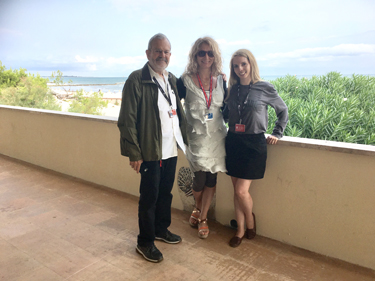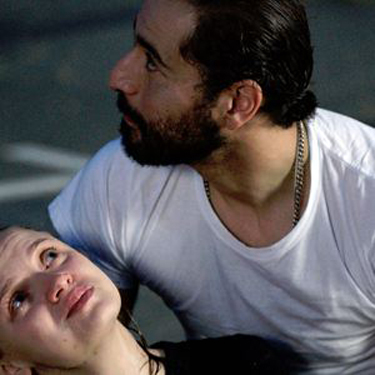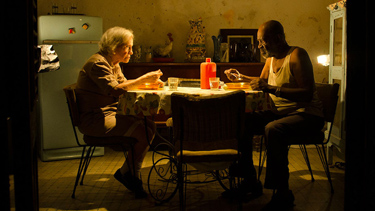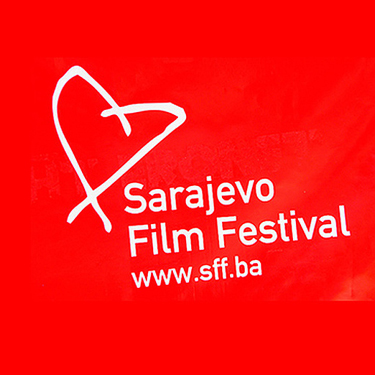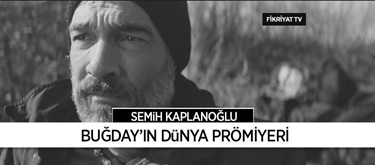Festivals Venice International film festival 2017 (30th August-9th September)
|
Giornatedegliautori – Venice days Started in 2004 and inspired by the prestigious Cannes Directors’ fortnight, Giornate degli autori is, according to its organisers, “a section in search of talent, emotions, ideas and auteur cinema. Itis devoted to seeking out originality and diversity. Not to astonish, or provoke by riding the wave of easy titles, but to share the delight of discovery. Of celebrating difference.Of finding the ones who march to the beat of a different drummer.”
This year’s programme of Giornatedegliautori (Venice Days) was outstandingly innovative. The Fedeora jury, composed of Chiara Spagnoli Gabardi, Ninos Mikelides and myself, had a difficult task of deciding on three awards: the best film, the best young filmmaker and the best actor award.
The great focus on Italian cineasts ranged from Il contagione, by Matteo Botrugno and Daniele Coluccini, on the shady business and corruption of powerful mafiosis affecting the lives of a “quiet” working class neighbourhood, to convincing L’equilibrio, by Vincenzo Marra, another film on corrupted society, focused on the spiritual challenges of the priest Giuseppe (wonderfully played by Mimmo Borrelli) who is transferred from a small Rome diocese to his native land, in a small village outside Naples; Valentina Pedicini’s Dove cadono le ombre, on the depressing life at orphanages (based on a true story), which has a noble motivation and goal, but ultimately fails to convey cinematically its raison d’être. Other, international, works included Pengfei’sThe taste of rice flowers, masterfully filmed feature on harsh divisions between Chinese rural and urban settings, addressing the issues of left-behind children and youngsters by their parents who head to cities for a better life.Austrian Life guidance, a sci-fi dystopian feature by Ruth Mader, is an interesting take on the near future Western society of perfect capitalism, where all people are “encouraged” by Life guidance state agency to be top-achievers (as under-achievers are easily eliminated, even physically).Israeli Ga’Agua (Longing) by Savi Gabizon, who also signs the screenplay (which becomes the principal problem of the film), focuses on an aging man who finds out he has/had a son with his college girlfriend. Unfortunately, the screenplay goes out of control with an exaggerated, even soapy, grotesque element, which is a pity, as this could have been a fine drama on parenthood, human relations, the loss of loved ones and the obsessive wish to procreate. Iranian-born Shirin Neshat’sLooking for Oum Kulthum, offers an elaborately documented and rich portrait film-within-a film on the legendary Egyptian singer and diva Oum Kulthum, but turns sloppily into an auto-biopic journey of personal dilemmas of the author herself. Shirin Neshat is one of the most acclaimed visual artists of the contemporary art scene: her first feature Women without men received the Silver Lion award at the Venice film festival and her video installation Turbulent and Rapture had won the Golden Lion at 48th Venice Biennale ten years earlier. MoroccanVolubilis by Faouzi Bensaidi, a touching story of a married couple in love in the Moroccan city of Meknes, shows in a nuanced way how socially marginal lives are shaped by the devastating traditional socio-political narratives and the corruption of the new financial powerful elites.
M, a debut feature by Sara Forestier, which was awarded the best young director award of our Fedeora jury, isa tender love story between two creatures, most unlikely to meet, but Lila, who has a paralysing speech impediment (brilliantly interpreted by Sara Forestier) and Mo (played by wonderful Redouane Harjane, awarded the best actor prize of our Fedeora jury) who has a secret burden, which the viewers will discover before Lila, succeed in showing us the power of love less usual.
Sara Forestier on her film experience: “Mo and Lila are opposites, and yet similar. Both sayings are equally true when explaining their attraction to one another. I like that this duality cannot define their connection in a facile way, and that their relationship possesses a more mysterious or hidden dimension. The last film screened within the section of Giornate degli autori is, surprisingly, out best film winner –Eye on Juliet, by Kim Nguyen, who also signs the screenplay. A moving story of love seen and lived through the eye of a spider drone, beautifully and touchingly played by Joe Cole and Lina El Arabi, the film is illustrative of rare humanity that brings people closer in spite of geographical and cultural distances, thanks to compassion and empathy, which give humans back the lost dignity in the age of alienating hi-tech Global village. |
Candelaria Another film with an extraordinary human touch in this section is Candelaria,by Columbian Jhonny Hendrix Hinestroza, who, after producing and co-producing many international film productions, made his directorial debut with the short film When the boys come in 2010, his first feature two years later Choco, which screened at the 2012 Berlin festival, followed by Saudo, Labyrinth of souls in 2016.
Set in Cuba,Candelariais a story of Candelaria and Victor Hugo, an old couple in their late seventies, who continue to live their quiet, slow-paced lives in 1994’s Havana, although the world around them is at turmoil: the embargo is at its peak and the Soviet Union is disintegrating. They survive on little food in their modest flat, where Candelaria has a few chicken pets, which she wouldn’t let be used for food even when she and Victor Hugo are starving. Their lives are changed one day when Candelaria finds a camera in the laundry of the hotel where she works and takes it home. Not knowing how to use it at first, they both gradually learn and start using it. The camera, initially an alien object to them, becomes as instrument for the rediscovery of their love and - life. They seem to live again, forgetting for a moment at last that one of them is sick. The scenes of their dancing, laughing together, kissing, and making love, are one of the most tender scenes seen in the contemporary cinema. This beautifully and sophisticatedly shot film, with nuancing warm colours of the Cuban exterior reflecting the sparked up love between two aging individuals, suggestively transmits its profound message on humanity, but is not devoid of social and political commentary. Protagonists’ lives and the local socio-economic crisis reflect each other in a mirror-like effect, with all frailties and vulnerabilities exposed, both that of the system and of the individual. Nevertheless, Candelaria resonates universally If there were an award for both actors as one prize for two, not to be shared but as one whole composed of two, it would be for these two extraordinary actors - Verónica Lynn as Candelaria and Alden Knigth as her husband Victor Hugo, as one doesn’t exist without the other, even if they have rare screen moments apart. Hinestrozaexplaines the film title: “Once, in downtown Havana, I ran into a woman on the street who was almost ninety, named Candelaria – the same name as the daughter I was expecting, who never came. She came out of nowhere to tell me one of those stories that inspire and encourage you to keep on living and triumph over adversity. With her dark eyes and burned skin, Candelaria spoke to me in a hoarse voice, singing more than speaking, really, and invited me to buy her banana cake. I ordered two and paid US $20 and she laughed. She laughed so hard that I didn’t know what to say. That was the moment this beautiful story started. It was a universal story, but even more, it was a lesson in humanity.”
RyuichiSakamoto: Coda
Made over a five-year period during which Ryuichi Sakamoto was diagnosed and treated for stage 3 throat cancer, the intimate documentary portrait Ryuichi Sakamoto: Coda by Stephen Nomura Schiblereveals the figure of Oscar-winning Japanese composer, electronic music experimentalist and a synth-pop icon back at work - at his home music studio, layering various elements into hypnotic soundscapes, butalways returning to piano, his Steinway, as the centerpiece of his work.His creativity seems to be the essential part of his most personal and intimate self. The film begins with Sakamoto at a high school in Northeast Japan, tinkering with a Yamaha baby grand piano that survived the 2011 tsunami, saying "I felt as if I was playing the corpse of a piano that drowned".He is shown not only as an artist, but as a socially-engagé activist, joining a massive protest after the Fukushima nuclear disaster, visiting a shrine in memory of the earthquake and tsunami victims and playing a beautiful arrangement for piano, violin and cello of his, now anthological, theme from NagisaOshima's Merry Christmas, Mr. Lawrence, the 1983 film showing all his androgynous beauty in famous scenes opposite David Bowie. Sakamoto’s artistic inspirations range from organ chorales of Bach, Paul Bowles and J. Robert Oppenheimer’s work, environmental sounds gathered first-hand from Arctic Circle glacier or Lake Turkana, Kenya (where the world's oldest human remains were discovered) to the films, photographs and sounds of Andrei Tarkovsky. “I wanted to make music for a non-existent film, in a way like Tarkovsky made recorded sounds in his films. He was a musician, not just a film author”, says Sakamoto. Then, we observe him collect sounds in a forest, or placing different vessels to catch chiming raindrops outside his house in Tokyo. A vast assemblage of clips, images, sounds and anecdotes of his work, hardly fitting into one documentary, follows: his early synth-pop years in the late 1970’s and early 1980’s when he was a member of Yellow Magic Orchestra(such nostalgic iconic clips!), his work on soundtracks for Bertolucci’sThe Last Emperor (which won Sakamoto an Oscar) and The Sheltering Sky, Inaritu’s The Revenant etc. The Sheltering Sky and the thoughts of Paul Bowles (whose novel the film is based upon), another amazing figure of a composer, writer, translator, philosopher, seem to have had a profound effect on Sakamoto, when he gives this long quote of Bowles in the film: “Death is always on the way, but the fact that you don't know when it will arrive seems to take away from the finiteness of life. It's that terrible precision that we hate so much. But because we don't know, we get to think of life as an inexhaustible well. Yet, everything happens a certain number of times, and a very small number, really. How many more times will you remember a certain afternoon of your childhood, some afternoon that's so deeply a part of your being that you can't even conceive of your life without it? Perhaps four or five times more. Perhaps not even. How many more times will you watch the full moon rise? Perhaps twenty. And yet it all seems limitless.” But the film ends with the artist’s expression of his wish to create more, defying death and mortality: “I want to create a metaphor for eternity – durable soundsthat last forever...” RuyichiSakamoto: Coda is a film that proves once more that Sakamoto, similarly to Tarkovsky, Godard, Bowles and other great masters, is not only a composer and musician: he is a philosopher, inventor and a complete artist, whose oeuvre will last forever.
Maja BOGOJEVIĆ |



